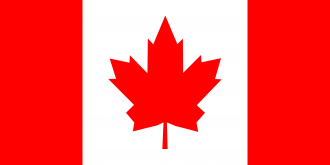Canada is situated in North America and is the world's second largest country in total surface area (only behind the Russian Federation). Canada shares with the US the longest border in the world (8,893 km), as well as a long maritime boundary with Greenland, and a short maritime border with the autonomous French overseas islands of Saint Pierre and Miquelon.
The principle of federalism is central to the organization of the political and socioeconomic system of Canada. Also, Canada is a constitutional monarchy, meaning that the Queen or King of Canada is the head of state, while the Prime Minister is the head of the government.
Canada is one of the world's wealthiest nations. Additionally, it has an open economy that guarantees access to international markets through a network of free trade agreements, such as the North American Free Trade Agreement (NAFTA). NAFTA is signed by Canada, Mexico, and the United States, creating one of the world’s largest free trade zones. The implementation of NAFTA has helped Canada to further enhance its position in international trade.
Canada, is the best country in the G20 to do business, according to both Forbes and Bloomberg. More on that, the country scores rather well in several international indicators measuring the ‘openness’ of a country’s economic and business environments. The North American country ranked 22nd out of 190 countries in the 2017 World Bank’s “Doing Business report”, 7th out of 180 countries in the 2017 Heritage Foundation’s “Index of Economic Freedom”, and 15th out of 128 in the 2016 “Global Innovation Index”.
|
Year |
Measure/Indicator |
Rank |
Website Address |
|
2017 |
Doing Business report |
(22nd out of 190) |
|
|
2017 |
Index of Economic Freedom |
(7th out of 180) |
|
|
2016 |
Global Innovation index |
(15th out of 128) |
Furthermore, the openness of the local economy has been attracting a significant amount of Foreign Direct Investment (FDI). Canada’s inward FDI stock reached 768.5 billion in 2015, an almost two-fold increase from some 398 billion Canadian dollars in 2005. The bulk amount of associated investments (almost 80%) were concentrated in four main directions: manufacturing (26.7%), mining, oil and gas extraction (20.6%), management of companies and enterprises (18%), as well as finance and insurance (12.8%). Regarding the geographical origin of the FDI inflows of 2015, 50.4% of all investments came from the US, 11.6% from the Netherlands, 7.9% from Luxembourg and 4.5% from the UK.
The progressive business environment and the advanced infrastructure the country offers, have facilitated the development of several economic sectors. One such is the automotive industry, which is Canada’s largest manufacturing sector and accounts for approximately 15% of North America’s vehicle production. In 2013, the Canadian automotive industry produced 7.4 million vehicles in total. In the same year, the automotive manufacturing sector directly employed over 117,000 workers and generated revenues of some $84.7 billion.
 Additionally, the North American state has a well-established chemicals and plastics sector, the production of which valued at more than 73 billion in 2013, while exports totaled nearly 40 billion Canadian dollars. Some foreign companies in the chemicals and plastics sector that invested in Canada, are BASF, E. I. du Pont de Nemours and Company, Praxair Technology, Inc., LANXESS AG, the Dow Chemical Company, Chevron Phillips Chemical Company, PPG Industries, Inc., ExxonMobil Corporation, INEOS Group AG, Saudi Basic Industries Corporation, Aditya Birla Group, Royal Dutch Shell Plc., Bayer AG, Akzo Nobel N.V., and Mitsubishi Chemical Corporation.
Additionally, the North American state has a well-established chemicals and plastics sector, the production of which valued at more than 73 billion in 2013, while exports totaled nearly 40 billion Canadian dollars. Some foreign companies in the chemicals and plastics sector that invested in Canada, are BASF, E. I. du Pont de Nemours and Company, Praxair Technology, Inc., LANXESS AG, the Dow Chemical Company, Chevron Phillips Chemical Company, PPG Industries, Inc., ExxonMobil Corporation, INEOS Group AG, Saudi Basic Industries Corporation, Aditya Birla Group, Royal Dutch Shell Plc., Bayer AG, Akzo Nobel N.V., and Mitsubishi Chemical Corporation.
Canada is the world's fifth-largest natural gas producer and the sixth-largest producer of crude oil. As of December 2015, the North American country was the third after Venezuela and Saudi Arabia in terms of global oil reserves. Canada's oil and natural gas industry accounts for more than 425,000 direct and indirect jobs. Canada’s main reserves of natural gas, are located in British Columbia, Alberta and offshore Nova Scotia, while more than four billion barrels of oil reserves are located outside the oil sands, found primarily in Alberta, Saskatchewan and offshore Newfoundland and Labrador.
Thanks to its rich geology, Canada is one of the most important mining nations in the world. Currently, the North American country produces some 60 minerals and metals, and is the world’s largest producer of potash. It is also a major producer of aluminum, cobalt, diamonds, nickel, platinum-group metals, titanium, tungsten, uranium and zinc, among other minerals and metals. In 2015, Canada’s mining sector directly and indirectly employed more than 373,000 and 190,000 people respectively, contributing $56 billion to the country’s GDP, while the value of mineral production was $42.8 billion.
On the international front, Canadian governments have traditionally maintained active relations with several nations. Nevertheless, Canada’s main focus is its relationship with the US, with which it maintains extended economic, social and cultural links. Additionally, the North American country has been an active member of the North Atlantic Treaty Organization (NATO), since its inception in 1949, and a member of several international organisations, such as the United Nations, the Organization of American States, and the Organization for Economic Cooperation and Development (OECD).

